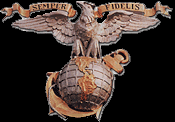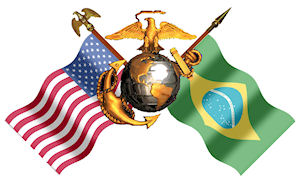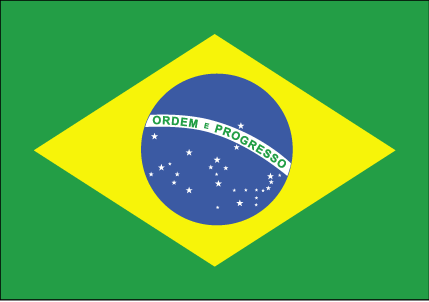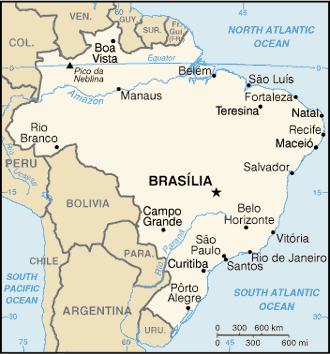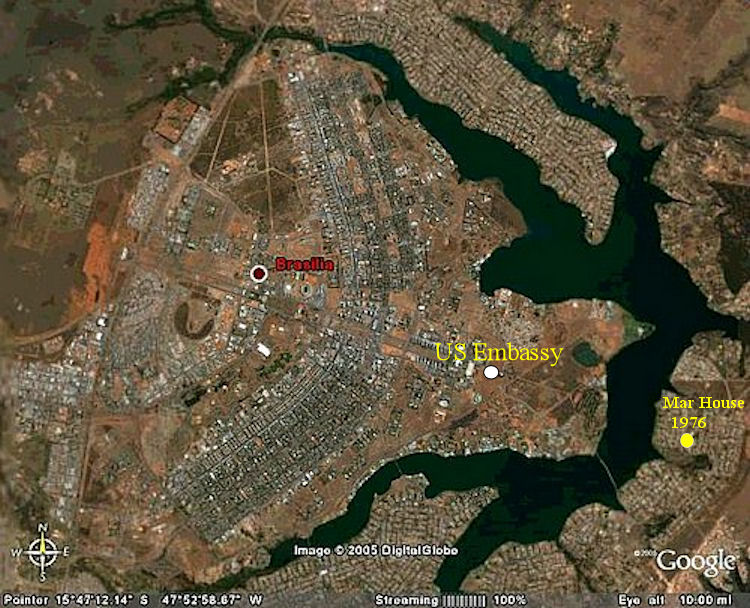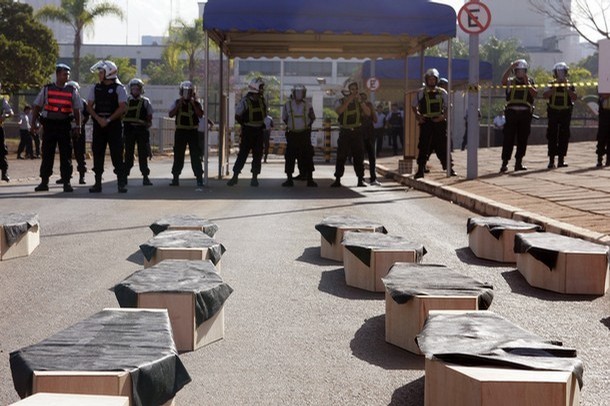| 2010 |
|
| Ambassador: |
Company Commander:
Detachment Commander:
Watchstanders:
|
|
|
| 2009 |
|
|
| 2008 |
|
|
| 2007 |
|
| Ambassador: Clifford
M. Sobel |
Company Commander:
Detachment Commander:
Watchstanders:
|
| Brazil
President: Luiz
Inácio Lula da Silva |
31 March :
Brazil Flights crippled by
Strike BBC
News
Aug 27:
Latin America-East Asia forum wraps up in Brazil
CCT
November 19:
American Basketball Player Found Dead in Brazil
Fox
News
[excerpt] The body of an American basketball
player
who was reported missing two weeks ago, was found in the middle of a
dense thicket in the central state of Goias, police said on Monday.
Police spokesman Norton Luiz said by telephone that the body
was
that of Tony Harris, a former Washington State University basketball
star who was under contract to Universo, a professional Brazilian
basketball team based in Brasilia, the country's capital. |
|
| 2006 |
|
| Ambassador: Clifford
M. Sobel |
Company Commander:
Detachment Commander:
Watchstanders:
|
| Brazil
President: Luiz
Inácio Lula da Silva |
|
Military helicopters lowered a rescue team by rope Saturday into the
remote Amazon jungle site where an airliner slammed into the ground,
but authorities held out little hope of finding survivors among the 155
people on board |
|
| 2005 |
|
| Ambassador: Philip
T. Chicola |
Company Commander:
Detachment
Commander:
Watchstanders:
|
| Brazil
President: Luiz
Inácio Lula da Silva |
May 14
11,000 Brazilians' long
march to Brasilia to protest land reform
The
Guardian
May 11
Arabs join summit in Brasília
NY
Times
[excerpt] With
9,000 soldiers posted
around the city and helicopters flying overhead, 16 government leaders
and top officials from 34 South American, Middle Eastern and North
African countries gathered for the Summit of South American-Arab
Countries.
Nov 10: Missing American Girl Turns Up
at Brazilian Police Station
Fox
News
[excerpt] A 17-year-old Oregon exchange student missing since last
weekend was found safe Thursday in northeastern Brazil, ending an
intense search by Brazilian authorities and the U.S. Embassy.
|
|
|
| 2004 |
|
|
2003
|
|
|
2002
|
|
| Ambassador:
Cristobal R. Orozco served as Charge' d'Affaires ad interim Feb 2001 -
Apr2002. / Donna
J. Hrinak |
Company Commander:
Detachment
Commander:
Watchstanders:
|
Brazil
President: Fernando
Henrique Cardoso
From: http://www.historyofnations.net/southamerica/brazil.html
President Lula, a former union leader, is
Brazil's first working-class president. He pledged social change and
promised to eradicate hunger. Investors remembered his radical rhetoric
of the past, and feared his election. As it became more apparent he
would win, the Brazilian currency weakened, and Brazil's country-risk
rating skyrocketed. In the months after his election, however, he took
a conservative fiscal path, warning that social reforms would take
years and that Brazil had no alternative but to extend fiscal austerity
policies. The Real recovered dramatically. At the same time, Lula
raised the minimum wage from 200 to 240 Reals per month, and stressed
his "Zero Hunger" initiative, designed to give each Brazilian three
meals a day. By the end of 2003, key legislation to reform
the nation's public sector pension system and to overhaul its tax
system had passed Congress, though follow-on legislation still needs to
be passed in 2004.
Brazil wins World Cup
Soccer - Wikipedia
|
|
|
2001
|
|
|
2000
|
|
|
1999
|
|
|
1998
|
|
| Ambassador: Melvyn
Levitsky |
Company Commander:
Detachment Commander: Juan C. Alvarado
Watchstanders:
Charles L. Hughes, Brian P. Lawler, Amy N. Knox, Curtis J.
Stopczynski, |
| Brazil
President: Fernando
Henrique Cardoso |
|
1997
|
|
|
1996
|
|
|
1995
|
|
|
1994
|
|
|
1993
|
|
|
1992
|
|
| Ambassador: Richard
Huntington Melton |
Company Commander:
Detachment Commander:
Watchstanders:
|
Brazil
President:
Itamar
Franco
Brazil President (Impeached): Fernando
Collor de Mello
Brazil
President: Itamar Franco
Shortly after Brazil hosted the United Nations Conference on
Environment and Development, also known as the Earth Summit,
President Collor was impeached. He resigned his post to Vice
President Itamar Franco.
Major corruption scandal led to President Collor de Mello's impeachment
and ultimate resignation. Vice President Itamar Franco took his place
and governed for the remainder of Collor's term |
|
1991
|
|
|
1990
|
|
|
1989
|
|
|
1988
|
|
|
1987
|
|
|
1986
|
|
|
1985
|
|
|
1984
|
|
|
1983
|
|
|
1982
|
|
|
1981
|
|
|
1980
|
|
|
1979
|
|
| Ambassador: Robert
M. Sayre |
Company Commander:
NCOIC:
Watchstanders: Steve
Boysen, |
Military
Dictatorship 1964 - 1985
Brazil President: João
Baptista de Oliveira Figueiredo
Brazil President: Ernesto
Geisel |
March 15: New Brazilian Leader, Sworn In,
Pledges Democracy;
Outgoing President Is Praised Mrs. Mondale
Represents U.S. NY
Times
General Joao Baptista de Oliveira Figueiredo
became
Brazil's new President in a ceremony as crisp as a finely cut salute
today and declared in his inaugural address that it would be his
"unswerving purpose" to make his country of 116 million people a
democracy
March 22: Mondale Sees
New Brazil Leaders; Points of Contention Avoided. NY
Times
Vice President Mondale met today
with Brazil's new President,
Gen. Joao Baptista de Oliveira Figueiredo, in an effort to continue the
recent improvement in relations, which deteriorated in the early months
of the Carter Administration.
|
|
1978
|
|
| Ambassador:
John
Hugh Crimmins / Robert
M. Sayre |
Company Commander:
NCOIC:
Watchstanders:
Steve Boysen, James G. Frye Jr., |
Military
Dictatorship 1964 - 1985
Brazil President: Ernesto
Geisel |
Operation Condor
- Wikipedia
[Excerpt] Operation Condor was a campaign of
political repressions involving assassination and intelligence
operations officially implemented in 1975 by the governments of the Southern
Cone of South America. The
program aimed to eradicate alleged socialist/communist influence and
ideas and to control active or potential opposition movements against
the governments.
Due to its clandestine nature, the precise
number of deaths directly attributable to Operation Condor will likely
never be known, but it is reported to have caused over sixty thousand
victims,
possibly even more.
Condor's key members were the governments in Argentina,
Chile,
Uruguay,
Paraguay,
Bolivia
and Brazil,
with Ecuador
and Peru
joining later in more peripheral roles
|
|
1977
|
|
|
1976
|
|
| Ambassador: John
Hugh Crimmins |
RMO:
Major Philip Ray / XO:
Capt Germain
Company
Commander:
NCOIC: Gysgt Lukondi (Wife Sally), ANCOIC: Sgt. Gary
Arnold
Watchstanders:
Sgt Dave Austin, Sgt
Jaime
Bonner, L/Cp Cole, Sgt Ron Garnes, Sgt Bill
Giorgetti, Cpl Jack
McGarry, Charlie
Norton, Vern "Smiley" Rogers, Cpl Ed Travis, Frank Williams, Mike Williams,
|
Military
Dictatorship 1964 - 1985
Brazil President: Ernesto
Geisel
-
Bicentenial Celibration, detachment provided a color guard.
- Henry
Kissinger Visit to South America. Company D MSGs augment Secret Service
Security Detail
DOS
People close to MSG Detachment: CC Fitzerald,
Embassy Locals close
with
detachment: Esther / Moira Lawrence (Brazilians with
English
Accents), (Moira is now working for the Peace Corps)
Locals:
Our maid was
a sweetheart...Maria
Memories:
-The transition from the old embassy to the newly constructed site.
-Macumba religion followers would place prepared meals (for their
"God"), in front of South African Embassy down the street...
- Softball League, Marines getting their butts handed to them ...
- Camping trip with American School Junior High kids...
- Marine House in Lago Sul, down the road from Geberto Solimon / Beer
Faus / Beside "the Coffee's".
- Vern Rogers (Kung Fu), Frank Williams (Tae Kwon Do) working out...
- Sgt Frank Williams and Judy Pepka (RSO Secretary)...Married
Awards
Ceremony |
August 23:
Brazil
Car Crash Kills Ex-President Eugene
Register-Guard LA
times
Juscelino
Kubitschek, the Brazilian president who built this nation's modernistic
inland capital of Brasilia, was killed in an automobile accident on the
Rio Sao Paulo highway Sunday night.
February 23
: Kissinger Visits Brasilia
Pittsburg
Post-Gazette
February 21 :
US, BRAZIL TAKE BIG STEP
TOWARD SPECIAL ALLIANCE LA
Times
Secretary
of State Henry A. Kissinger announced Thursday a new "formal agreement"
on economic and political consultation between the United States and
Brazil that represents a major step toward a special relationship
between the two most populous nations... |
|
|
1975
|
|
| Ambassador: John
Hugh Crimmins |
Company Commander:
NCOIC: Gysgt
Lukondi (Wife
Sally), ANCOIC:
SSgt Vernon Rogers
Watchstanders:
Sgt Gary
Arnold, Dave
Austin, Jaime Bonner, LCpl
Cole, Sgt
Leroy Craytor, Bill
Giorgetti, Cpl Jack McGarry, Charlie Norton,
Vern Rogers, Sgt. Frank Williams, Mike Williams, .. |
Military
Dictatorship 1964 - 1985
Brazil President: Ernesto
Geisel |
August 28;
Crime on increase in Brasilia
Toledo
Blade
February 22: Hijacker
Killed as Jet With 69 Lands in Brazil
LA
Times
Police
stormed a hijacked jetliner Saturday night, shooting and fatally
wounding the bearded young man who had seized control of the plane on a
domestic flight.
BRASILIA-A hijacker commandeered a Brazilian airliner with 80 persons
aboard for eight hours today before the police slipped aboard and shot
him to death
|
|
1974
|
|
|
1973
|
|
|
1972
|
|
|
1971
|
|
|
1970
|
|
|
1969
|
|
| Ambassador:
John
Wills Tuthill / C.
Burke Elbrick |
Company Commander:
NCOIC:
Watchstanders:
|
Military
Dictatorship 1964 - 1985
Brazil President: Emílio
Garrastazu Médici
Brazil
President (Military Junta):
Augusto
Hamann Rademaker Grünewald
Brazil President: Artur
da Costa e Silva
October:
President Costa e Silva
died unexpectedly,
Officer corps of the three services consulted among themselves to pick
General Garrastazú Médici for the presidency.
Severe political repression and
censorship accompany record annual economic growth of nearly 12 percent
led by state-owned enterprises.
A program of economic expansion includes vast projects such as the
Trans-Amazonian highway and the world's largest dam at Itaipú
Kidnapping of Ambassador Elbrick
from Wikipedia
In 1969 the Revolutionary
Movement 8th October kidnapped Charles
Burke Elbrick, the U.S. ambassador to Brazil. The rebels
demanded the release of imprisoned dissidents in exchange for
Ambassador Elbrick. The government responded by adopting more brutal
measures of counter-insurgency,
leading to the assassination of Carlos
Marighela, a guerrilla leader, two months after Elbrick's
kidnapping. This marked the beginning of the decline of armed
resistance. In 1970, Nobuo Okuchi, Japanese consul general in Sāo
Paulo, was kidnapped and Curtis C. Cutter, U.S. consul in Porto Alegre,
was wounded in the shoulder but escaped kidnapping. Also in 1970, Ehren
von Holleben, West German Ambassador, was kidnapped in Rio and one of
his bodyguards was killed.[1]
According to a government-sponsored truth and
reconciliation commission in 2007, by the end of the 21 years
of dictatorship there were 339 documented cases of government-sponsored
political assassinations or disappearances. More were questioned,
tortured, and jailed
Dept
of State Communications concerning incident - Historical Archives
Telegram
from US Embassy Rio to US State Dept (Sept 4, 1969)
Telegram
from State Dept to US Embassy Rio (Sept 4, 1969, 2256)
Memorandum
from SecState Kissenger to President Nixon (Sept 25, 1969,
2256)
|
|
|
1968
|
|
|
1967
|
|
|
1966
|
|
|
1965
|
|
|
1964
|
|
| Ambassador: Lincoln
Gordon |
Company Commander:
NCOIC:
Watchstanders:
L/Cpl Lefeber, L/Cpl Marsicano, |
Military
Dictatorship 1964 - 1985
Brazil President: Humberto
de Alencar Castelo Branco
Brazil President: Ranieri
Mazzilli
Brazil
President Joao
Goulart
Military
coup: President Joao
Goulart removed
|
Military
Coup & Dictatorship 1964 - 1985
From: http://www.historyofnations.net/southamerica/brazil.html
Further Reading: Brazil
Military Dictatorship (Wikipedia)
Joao Goulart's years in office were marked
by high inflation, economic stagnation, and the increasing influence of
radical political elements. The armed forces, alarmed by these
developments, staged a coup on March 31, 1964. The coup leaders chose
as president Humberto Castello Branco, followed by Arthur da Costa e
Silva (1967-69), Emilio Garrastazu Medici (1968-74), and Ernesto Geisel
(1974-79), all of whom were senior army officers. Geisel began a
democratic opening that was continued by his successor, Gen. Joao
Baptista de Oliveira Figueiredo (1979-85). Figueiredo not only
permitted the return of politicians exiled or banned from political
activity during the 1960s and 1970s, but also allowed them to run for
state and federal offices in 1982.
|
|
|
1963
|
|
|
1962
|
|
|
1961
|
|
| Ambassador:
John
M. Cabot / Lincoln
Gordon |
Company Commander:
NCOIC:
Watchstanders:
|
Brazil
President Joao
Goulart
Janio Quadros resigned in 1961, Vice President Joao Goulart
succeeded him.
Brazil
President: Juscelino
Kubitschek de Oliveira
Brazil President: Ranieri
Mazzilli |
January
11: Brazil
in Throes of a Nightmare;
President - Elect Quadros is Faced with Insolvency
and
Soaring Inflation Rate
-
Brazil Near Fiscal Insolvency
New
York Times
January 11: Brazil
Troops Fire Tear Gas at Student Strikers
Quadros
Orders Navy Ships With Marines Aboard to Communist-infested Recife
Army
troops fired tear gas at student strikers in Communist-infested Recife
Saturday as two Navy
destroyers steamed toward the northeastern port with marines
LA
Times
May 31:
US
Admiral Intercedes in Cruise Liner Hijack off of Recife
Wikipedia
The
Freelance Star
May
18:
U.
S. Grants Brazil 338 Million Loan Chicago
Tribune
The
United States today lent Brazil 338 million dollars and renegotiated
debt payments totaling 305 million dollars in the largest credit
package ever assembled by the American government.
June 8:
Brazil Chides
Students; Strikers Urged to Return to Classes in Recife
-
Troops Sent New
York Times
June 23:
SecTresury
Douglas Dillon & SecState Adlai Stevenson Visit
-
Cuba Discussion with
Brazil / Latin America - Time
Magazine
December 17: Circus Catches
fire in Niteroi History.com
|
|
1960
|
|
| Ambassador: John
M. Cabot |
Company Commander:
NCOIC:
Watchstanders:
|
Brazil President: Juscelino
Kubitschek de Oliveira
Capital
moves from Rio de Janeiro to
Brasilia |
December
14: Military
Revolt in Addis Ababa. Massacre of Members of Government
While Emperor in
Brasilia. Keesling
October 17: Brazil elects
Jânio da Silva Quadr
Time
Magazine
June
25: 51
KILLED IN CRASH OF BRAZILIAN
AIRLINER LA
Times
April
21:: BRAZIL
MOVES ITS CAPITAL TO NEW BRASILIA
100,000
Attend Mass, Carnival
Chicago
Tribune New
York Times
Brazil's
New Capital City is Born
February 23 - March 8 : Eisenhower
Visit to Brazil Keesings
" President Eisenhower began
his goodwill tour of Latin America with a three-day visit to Brazil during
which he visited Brasilia (the new capital under construction in the
interior), Rio de Janeiro, and São Paulo. He was welcomed at
Brasilia on Feb.
23 by
President Kubitschek,
saw the work in progress on the new capital, and had discussions with
the Brazilian President,
with whom he drove to the site of a monument which will commemorate the
visit. "
(©
1931-2006 Keesing's Worldwide, LLC - All Rights Reserved).
Time
Magazine
|
|
1959
|
|
|
1958
|
|
|
1957
|
|
|
1956
|
|
|
1955
|
|
|
1954
|
|
|
1953
|
|
|
1952
|
|
|
1951
|
|
|
1950
|
|
|
1949
|
|
|
| 1948 |
|
|

